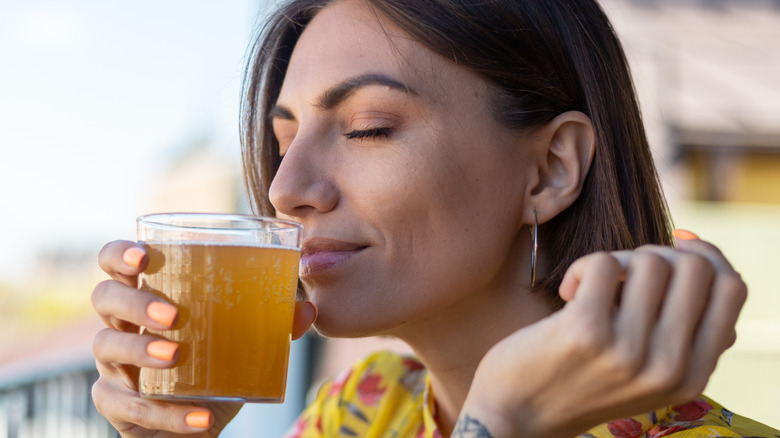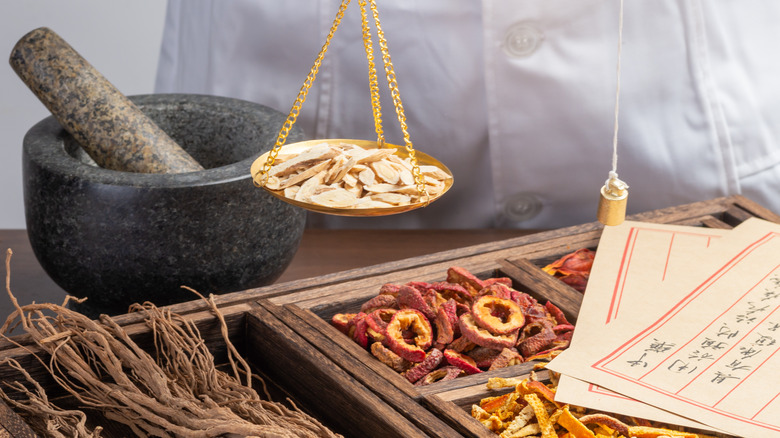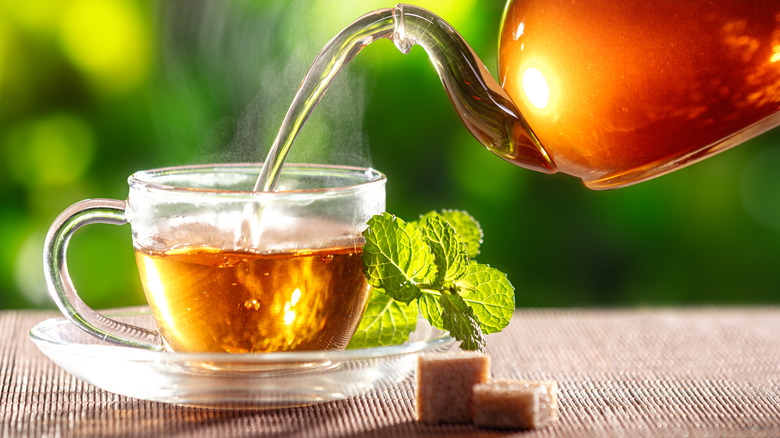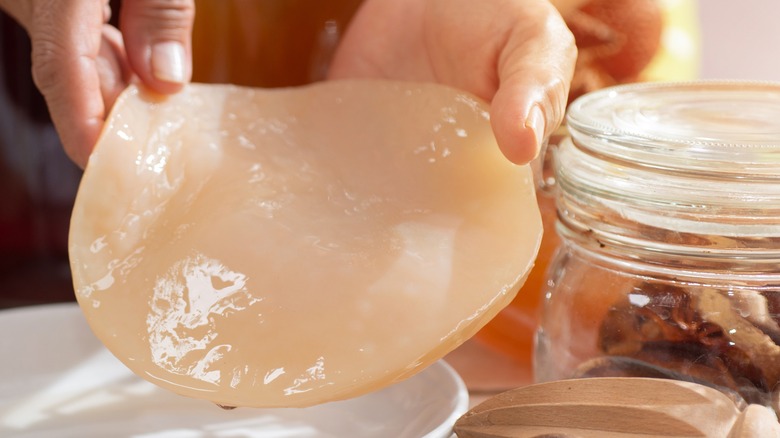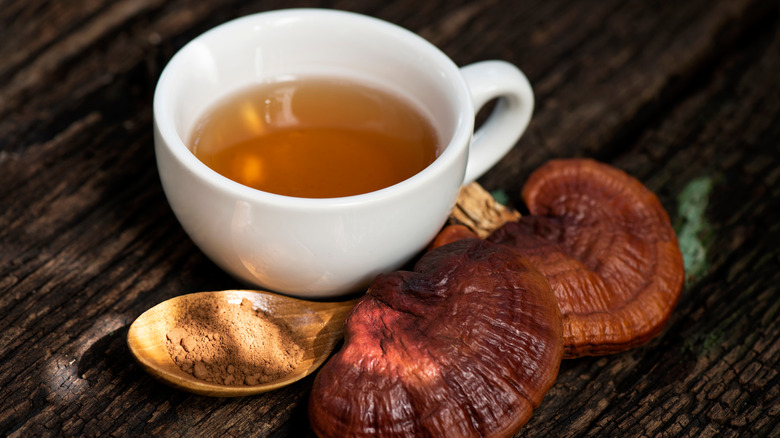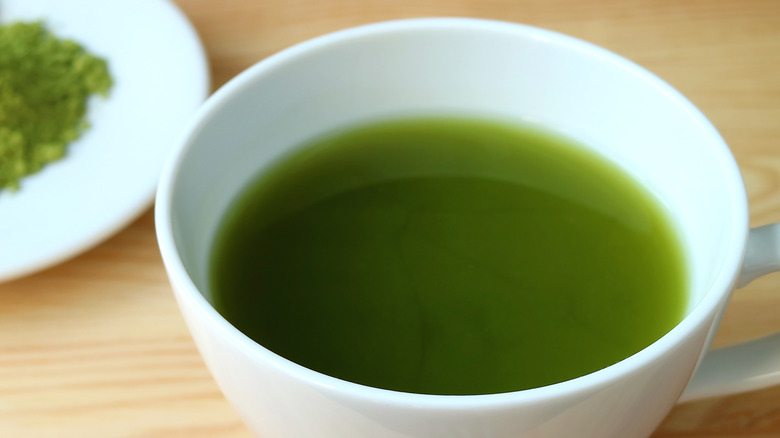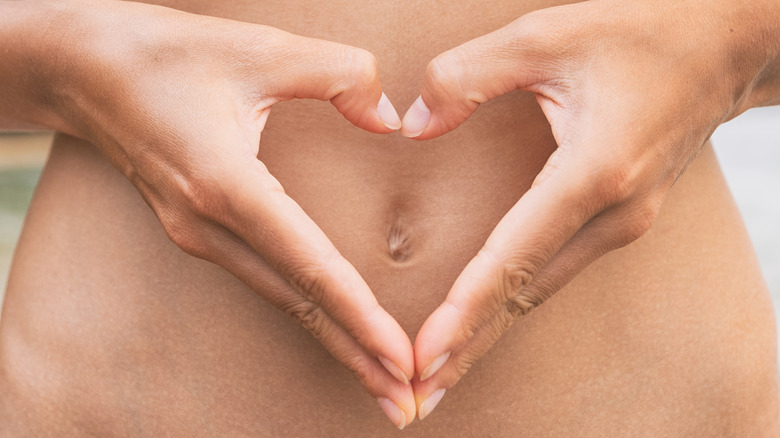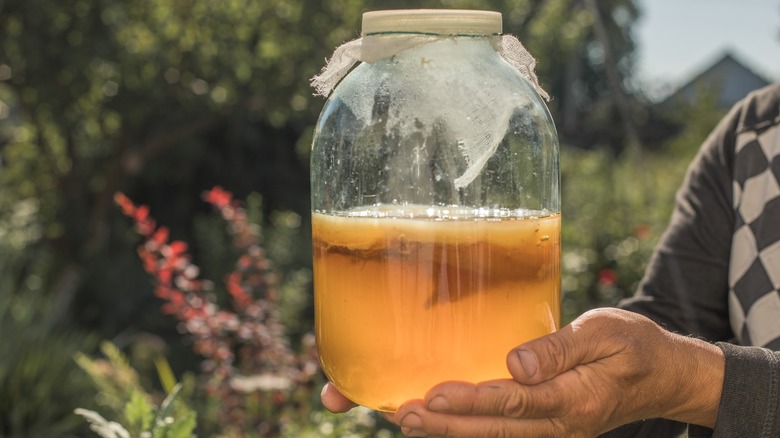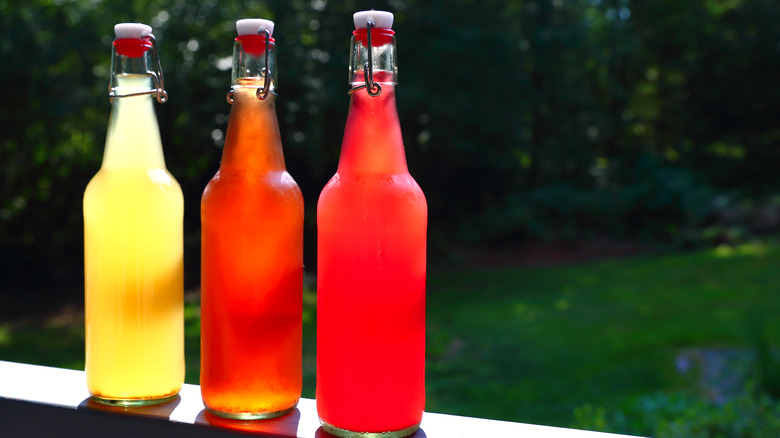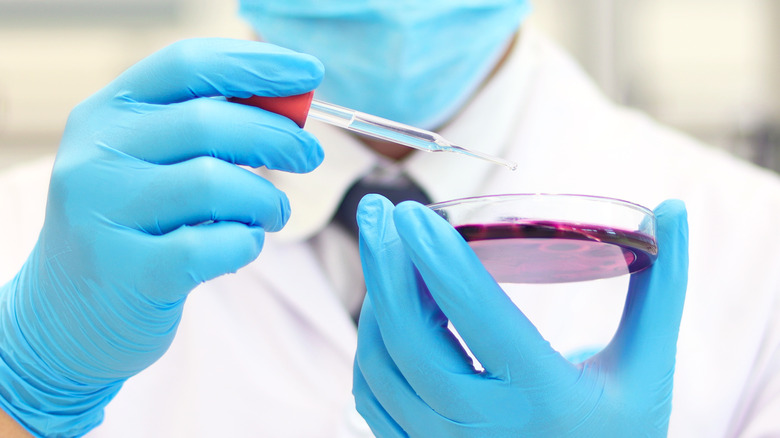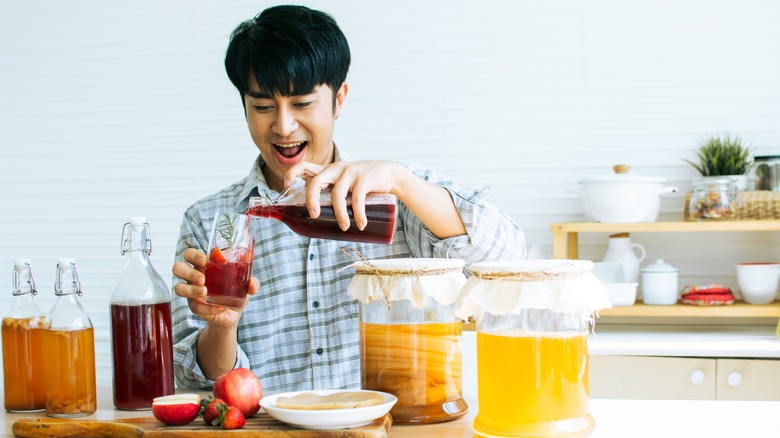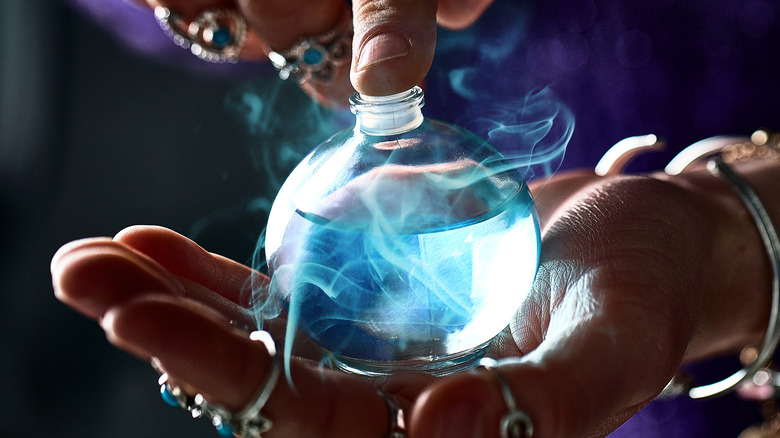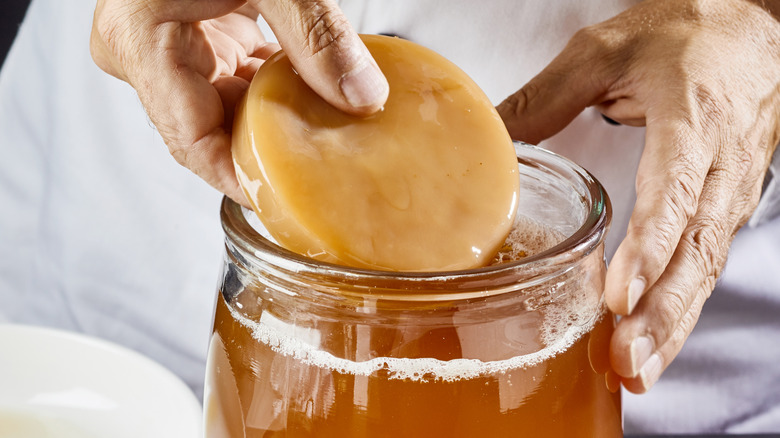What You're Really Drinking When You Drink Kombucha
It's unlikely you don't know about kombucha yet, and there's a pretty good chance you've both tasted it and heard the countless health claims surrounding the elixir. With an industry worth more than $1.8 billion, you'll find kombucha just about everywhere today, from your neighbor's house to your favorite restaurant, and even at bars. Flavored, unflavored, and alcoholic versions too, there are few limits to what's being done with the tea-based beverage. But why is it suddenly so popular?
In a health-conscious age, kombucha is attracting plenty of attention as a potential source of benefits ranging from improved digestion and heart health to detox cleanses and immune system boosts. The question remains as to whether the contents of this seemingly magic brew could actually lead to any or all of those benefits. Despite its surprising age, there isn't a ton of verifiable science surrounding kombucha available and misleading information runs rampant. Nonetheless, here is what we know for sure when it comes to what you're really drinking when you sip kombucha.
You're drinking an ancient drink, not a trendy new tea
Kombucha may seem like today's trendy new cure-all drink and while it may have only gained mass popularity in the past few years, it's certainly been around much longer. Much, much longer in fact. In China, kombucha has been a well-known health drink for thousands of years, according to Channel News Asia. The funky beverage first spread to other nations in Asia long before hitting the Western world.
Although Forbes reports that kombucha was created in Northeast China in 220 BCE, it is presumed to be named after the Korean physician Dr. Kombu, who brought the concoction to Japan for an emperor. With Chinese origins, Korean nomenclature, and Japanese success propelling kombucha to acclaim far away from home, talhough it took another 1600 years to reach intercontinental fame, it's safe to say kombucha has arrived on the world stage.
At its core, it's tea
If you're unfamiliar with kombucha, it certainly may sound exotic and mysterious to you, but it's not terribly different from what you already know. At its very core it's just tea, Forbes explains. While there's plenty that happens to the brew after steeping the leaves, it almost always begins with basic black or green tea. Once the tea leaves are steeped and a proper tea is brewed and sweetened, a few extra (and incredibly critical) steps take place.
First off, it's essential to allow the tea to cool to room temperature before proceeding since you're about to add a live culture to the liquid (via Science and Food). From here, there's a two-step fermentation series that includes an initial sugar fermentation and a secondary fermentation during which flavoring agents can be added for those who prefer something a little juicier. Don't think you can snag a shortcut if you're sticking with unflavored kombucha. For true kombucha, you still need to allow the brew to undergo its second fermentation whether or not you're adding any flavoring agents.
Kombucha's critical ingredient is a bacteria colony
Yes, if you want to drink kombucha you'll have to be okay with using living organisms to create your beverage. In order for the base tea to ferment and become kombucha, you need to include yeast and bacteria in your recipe, both of which are alive. If you're concerned about whether this violates any tenets of veganism, rest assured it doesn't. Healthline reports that both yeast and bacteria are single-cell organisms with no central nervous system. Consequently, as they are not animals, using them to make kombucha doesn't violate principles regarding harm to animals.
Back to the bacteria, there's no cause for alarm for non-vegans, either. While some types of bacteria are harmful for human consumption, those in a kombucha scoby are nothing to worry about. FoodPrint indicates that scoby is an acronym representing a symbiotic colony of bacteria and yeast. The bloblike formation is added to sweetened cooled tea to begin the first fermentation step. Scoby generally only stays alive while enveloped in kombucha, which means you'll need to obtain it from someone who has already produced the fermented tea. If you're home brewing and don't have friends willing to part with a live scoby, you can easily purchase one.
There's no actual mushroom involved
Okay, this one is less straightforward than it seems, so let's start with a common misconception surrounding kombucha. During the primary fermentation, some recipes call for adding a kombucha mushroom, causing some people to refer to the beverage as mushroom tea (via Mayo Clinic). While this nickname persists, the kombucha mushroom is merely the scoby. Admittedly, the blob may look like a mushroom and its slimy texture doesn't help shake the name, but in fact, there are no mushrooms in your drink.
Here's where the super literal can really nerd out, though. As we learned, the kombucha scoby contains yeast which is a single-cell fungus (via Live Science). So although scoby itself is not a mushroom, it does contain microscopic fungi. While many people inaccurately interchange the words mushroom and fungus, they are not the same. Whether you enjoy drilling down to the nitty-gritty details or are just interested in the bottom line, here it is: No matter what anyone says, there are no mushrooms in a basic kombucha recipe.
It has more polyphenols than plain tea
In case you're not familiar with polyphenols at all (and if you're not a nutritionist, botanist, or health expert, why would you be?), they're antioxidant compounds found in plants, according to Healthline. The outlet explains that they're often sought after to improve circulation, promote healthier blood vessels, and reduce inflammation. Kombucha is regularly praised for its abundance of polyphenols and ability to promote heart health, but detractors make a strong case that this has little to do with the kombucha itself.
While the drink is full of potentially beneficial polyphenols, this is mainly due to the simple fact that kombucha is a tea. Tea is an excellent source of polyphenols, so you don't necessarily need to spring for kombucha if you're seeking antioxidants — you could just drink tea. Still, dietitian Maxine Smith tells the Cleveland Clinic that fermentation actually increases polyphenol content, and most kombuchas are fermented twice. As such, while the source of polyphenols is the tea, kombucha's double fermentation adds an extra boost.
You may be swallowing some probiotics for your gut
The claims about kombucha's benefits on gut health have likely made it the popular health drink of choice in recent years. TIME reports that due to the fermentation process, kombucha may contain probiotics. These are believed to support gut health as well as many systems within the body.
The purported benefits of probiotics in kombucha in particular rest within the scoby which, you may recall, is an entire community of bacteria including fermentation-causing microbes. Whereas a single source of probiotics may not actually produce much interaction with your body's natural probiotics, an entire community of them may have a better chance of producing significant effects, biologist Athena Aktipis reports (via Discover).
Still, in order for microbes to be labeled probiotics, Cleveland Clinic explains that they need to meet additional criteria, meaning not all microbes are probiotics. Furthermore, there isn't any concrete proof that those in kombucha are probiotic, or that they can even survive in the human gut at all (via Discover). Epidemiologist Julie Kapp also notes that depending on the kombucha's level of processing or pasteurization, the potential benefits might be eliminated.
There's always alcohol in kombucha
By now, you're fully aware that kombucha is a fermented product. The first fermentation during which the bacteria and yeast consume sugar added to the tea is essentially the same process alcoholic beverages undergo in order to produce alcohol. If you're following along carefully, then you may have already asked yourself whether that means kombucha also contains alcohol. According to Healthline, the answer is yes, and some more than others.
The greatest chance of encountering significant alcohol levels comes from home-brewed kombucha, simply because the fermentation process of a hobbyist is unsupervised and less likely to be consistent or well-controlled. Commercial kombuchas, however, are still not alcohol-free since the fermentation process will always create some alcohol.
So why are consumers of all ages permitted to purchase kombucha? Since the U.S. Tax and Trade Bureau only regulates alcoholic products if they contain 0.5% or more alcohol, below this threshold a drink is considered safe for anyone to consume. Consequently, commercial kombuchas are careful to ensure they stay under this limit.
There's carbonation in flavored kombucha
To some degree, carbonation occurs naturally during the fermentation of all kombucha. The most significant amount is produced during the bottling process when flavoring and a second fermentation occur (via The Spruce Eats). Because some homebrewers don't flavor their kombucha or wait for a second fermentation, there won't always be noticeable carbonation. However, if you're sampling a flavored kombucha, it certainly went through a second fermentation and will have some fizz.
During any alcoholic fermentation (which we know includes kombucha fermentation), Serious Eats explains that carbon dioxide is naturally produced. Since there's no firm seal affixed during kombucha's primary fermentation, most of the gas will escape. Still, the scoby mass may provide enough of a seal to trap some beneath and provide a bit of carbonation in this initial step. In the second fermentation, kombucha is bottled with a tight seal, thereby trapping the gas within and creating bubbles. Furthermore, by adding fruit or sugar you can produce even more carbonation by feeding the yeast (via You Brew Kombucha).
You might be drinking harmful bacteria
The scads of bacteria used to ferment kombucha may be touted for their alleged health benefits, but not all bacteria are safe to consume. Nothing about the proper kombucha brewing or fermenting process intentionally introduces harmful bacteria into the final product. You shouldn't encounter any of these unwelcome critters in the commercial kombucha you pick up at the corner deli, but you might want to exercise some extra precaution when sampling home brews from well-meaning friends and family.
Because of potential dangers from missteps during the home brewing process, some diet and health experts recommend that certain populations steer clear of home-brewed kombucha, including the elderly and those with compromised immune systems, according to Vice. So what are those potential dangers? Professor of medicine and chief of clinical nutrition Zhaoping Li tells Vice that without a completely sterile environment, contamination can introduce dangerous bacteria like E. coli to the mix. Additionally, homebrewers are rarely equipped to measure the acid content of their output which can be equally harmful.
It can be suitable for weight loss diets
Sugar is a primary ingredient in kombucha, so it may not sound like the best choice of diet drink at first mention. However, among the many health claims surrounding this beverage, possible weight loss makes the list (via Kombuchee). Before you go looking for a sugar-free kombucha, remember that zero sugar results in no fermentation, which means no kombucha. Nonetheless, kombucha actually can be a suitable diet drink if you use it as an alternative to less healthy beverages you're already consuming.
Compared to most sodas, kombucha has less sugar ounce for ounce, according to Everything Kombucha. If this is your primary concern and soda is your current drink of choice, kombucha is a superior alternative. To put your mind further at ease, recall that plenty of the sugar added to the initial tea serves as food for the scoby, so it's not all making its way into your body.
Still, flavoring agents added during secondary fermentation often double as sweeteners, so it's worth checking out your favorite bottle's nutrition label to see just how much sugar ends up in the final product. The good news is that although some brands may be negating the drink's potential health benefits with too much sugar, there are plenty of sugar-conscious options that keep the sugar content at reasonable levels (via Cooking Light).
You're not drinking a miracle drink
It's important to understand that there are no known miracle foods, drinks, or pills, and that includes kombucha. While the popular drink may be a trendy cure-all around, it's just that: a trend. That doesn't mean there are no benefits to drinking kombucha or that it is unhealthy, but don't expect it to cure diseases, shed pounds, or prevent major illnesses on its own.
Despite its tremendous fan base worldwide, TIME reports that there simply aren't any well-controlled studies that demonstrate the health claims surrounding kombucha. Instead, proponents of the fermented drink and the brands that market it rely on studies of tea and probiotics, fairly new fields in the medical community. While kombucha is made with tea and likely contains probiotics, a lot can change when ingredients are mixed together and processes (like fermentation) are foisted upon them.
Since there are no scientifically acceptable studies demonstrating the health benefits of kombucha yet, the industry has been advertising the value of its ingredients, leading many consumers to assume this applies to finished kombucha too. It may, but the proof has yet to come.
Home brewed kombucha could contain lead
Generally speaking, commercially brewed kombuchas are carefully prepared and should not contain harmful substances. Far less consistent are those made in home kitchens, and there are plenty of documented cases of home-brewed kombuchas yielding adverse health effects, including at least one known death (via National Capital Poison Center).
Lead poisoning is considered more of a risk to children, with 1 in 40 children age 5 and under showing unsafe levels in their blood, per the University of Michigan Health. Nonetheless, ill-prepared kombucha brewed at home is one known way to encounter this malady as an adult. When kombucha is prepared in ceramic containers, the acid produced as the scoby eats the sugar can leach lead from the glaze (via NCPC).
Of course, this is true for plenty of liquids prepared or even served in certain ceramics, so it's always critical to be sure your favorite ceramic pot, bowl, or mug is actually food-safe (and you shouldn't assume they always are, especially when handmade by artisans).
